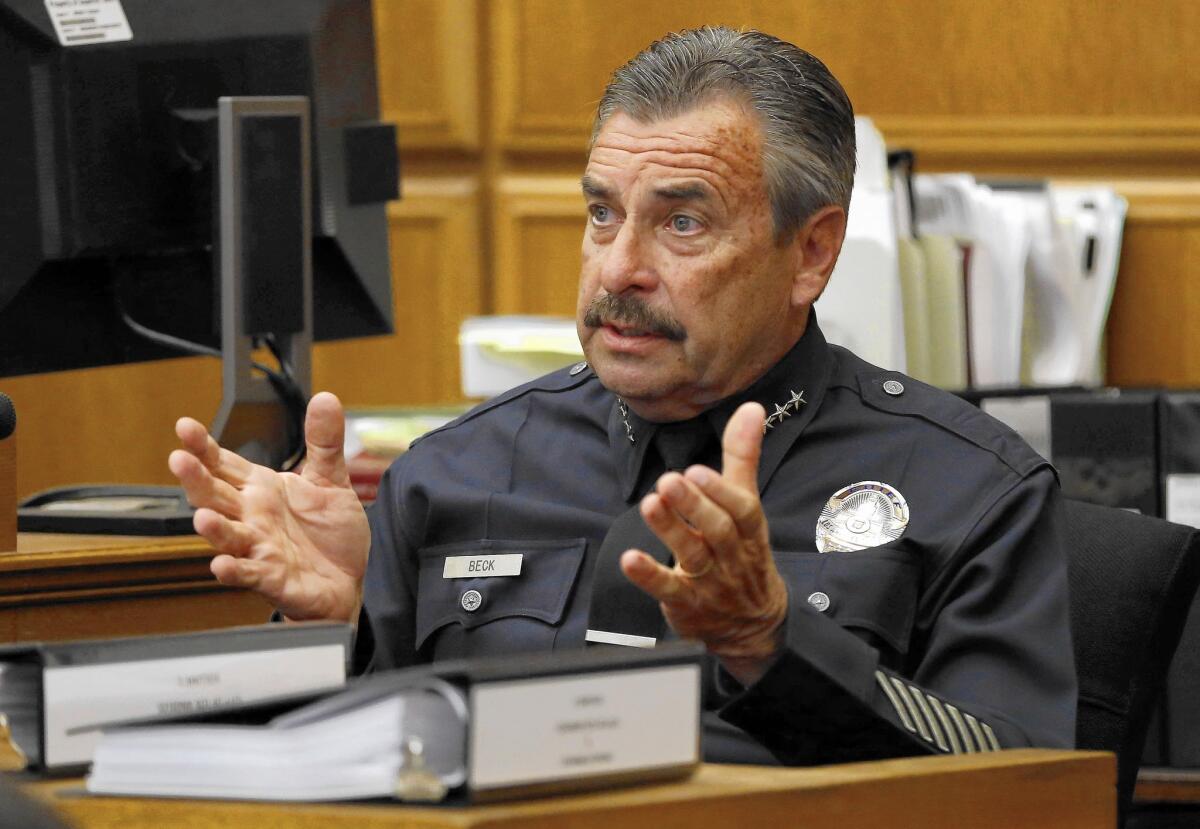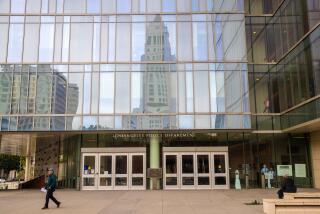LAPD’s inconsistent discipline has a steep price

There were no vigils, no protests, no #blacklivesmatter tweets when Steven Washington, 27, alone and unarmed, was killed five years ago by a Los Angeles police officer on a dark Koreatown street.
The shooting was blamed on tactical errors; the officer and his partner were disciplined. Two years later, the city paid $950,000 to the dead man’s mother to make the case go away.
That’s why I was surprised to read that the two officers involved scored a courtroom victory last week: a $4-million judgment in a discrimination lawsuit they filed against the Los Angeles Police Department.
The officers, who are Latino, claimed the department punished them too harshly because the man who died was black.
“That put political pressure on everybody,” said the officers’ attorney, Gregory W. Smith. He contends that the LAPD brass feared community blow-back if the officers returned to the streets. “That’s why they were taken out of the field for five years.... They couldn’t promote, couldn’t do anything.”
It’s a novel twist on the “race card” tactic — this idea that black lives matter so much that the officers paid too high a price for Washington’s death.
The trial’s multiracial jury agreed and awarded the two officers about $2 million each.
That felt like a perversion of justice to me. Why should they be rewarded for a senseless shooting?
But I’ve come to see the verdict as less a commentary on racial matters or police tactics than a warning that the LAPD’s discipline system is sorely out of whack.
::
Washington’s death didn’t garner much attention at the time. There were complaints by his grieving family and questions from the American Civil Liberties Union. But the focus was on the LAPD’s treatment of people with mental disabilities, not the young man’s race.
Washington, who had autism and was fearful of strangers, was walking home around midnight when the two officers began following him along Vermont Avenue after they heard a “suspicious” noise nearby.
One called out to him from the patrol car. Washington grunted, waved an arm and reached toward his waistband, the officers said. An officer fired from inside the car and shot Washington in the head. The other officer fired and missed, as Washington fell.
He had no weapon, just a cellphone clipped to his pants.
After a long internal investigation, LAPD Chief Charlie Beck ruled the officers’ tactics had been improper but the shooting was not. The cops may have poisoned the encounter by the way they approached Washington, but his response justified their belief that he might have had a gun, Beck said in 2012.
In a rare reproach, the civilian Police Commission overruled the chief and came down hard on the cops. The evidence did not support their account, the panel said. Washington “did not engage in any conduct that posed a threat.” The shooting violated department policies on use of lethal force.
The official punishment, left to Beck, was a proverbial slap on the wrist. The officers were ordered to undergo retraining and issued reprimands.
It was the unofficial punishment that shut down their careers: They’ve been assigned to desk jobs since then and told by commanders that they shouldn’t expect to be promoted, Smith said.
Beck testified in the discrimination trial that he has no intention of returning the pair to the streets. “I do not have confidence in their ability to perform the duties of a field officer,” he said.
Yet others involved in similar cases have been treated with leniency, including a white cop who testified that when he killed an unarmed Latino in an out-of-policy shooting a few months after Washington died, he was returned to street patrol after six weeks.
“Why did this one officer get six weeks, while these two officers, their careers are finished?” Smith asked. “Because the department is frightened about issues with race, they punish them unfairly.”
The multimillion-dollar jury verdict, he said, was compensation for that.
::
The department’s disciplinary system has been the Achilles’ heel of Beck’s tenure as chief.
It is cumbersome, secretive, freighted with conflicting accounts and subjective reviews. It allows leeway and provides power in ways that seem to have turned some of the chief’s best qualities into his worst enemies.
He believes in second chances, he’s willing to trust his gut, he’s loyal to his allies and not afraid to buck the crowd.
That’s what saved Officer Shaun Hillman from being fired last year after he pulled a gun on a stranger in a drunken off-duty rant, used a racial slur to describe the man to deputies on the scene and lied about the incident to LAPD investigators.
The Police Commission recommended termination. Officers have been fired for less. But Hillman is the son and nephew of veteran LAPD cops. Beck gave him a three-month suspension instead.
An aura of favoritism has dogged Beck ever since. That makes the disciplinary system an easy target for disgruntled officers on a force that’s already had more than its share of expensive workplace-related lawsuits.
“Everybody I’ve talked to has said they’ve never seen it so bad,” said Smith, who has handled court cases for dozens of officers. “Discipline in the department is very, very uneven. If you know the right person, nothing bad is going to happen to you. If you don’t know the right person, you can get thrown under the bus.”
Beck may have done in this case just what we’d like him to do: keep trigger-happy officers off the street.
But the perception of unfairness can taint everything it touches. This verdict may be a crazy but inevitable consequence of unseemly compromise and uncertain standards.
Twitter: @SandyBanksLAT
More to Read
Start your day right
Sign up for Essential California for news, features and recommendations from the L.A. Times and beyond in your inbox six days a week.
You may occasionally receive promotional content from the Los Angeles Times.







